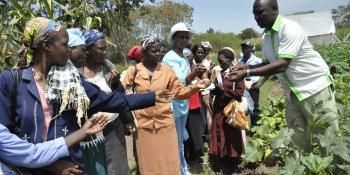Improving science in Africa key to implement mitigation strategies for livestock

by Silvia Silvestri and Jane Gitau
The livestock scene in Africa is dramatically changing, with increased population growth, putting pressure on resources, and growing consumption of meat, milk and eggs.
The need for more protein however, has been met through increasing the number of animals rather than improving the livestock productivity. This was noted by Mario Herrero, former team leader at the International Livestock Research Institute (ILRI), who spoke at a workshop held a while back in Nairobi, Kenya.
His recommendations, looking forward, is to concentrate on improving efficiency, in the livestock sector, thus reducing the GHG emissions per unit.
Improved data on livestock production systems and sources of emissions, and development of country specific emissions factors, are some of the top priorities in the effort to implement mitigation strategies for African livestock production systems. Priorities also include the development of expertise through training opportunities for both modeling and measurement, implementation of coordination and the need for adequate funding to carry out research activities.
This conclusion was drawn from the country discussions at the workshop “Measurement and mitigation of greenhouse gases in African livestock systems: building capability to meet the challenge”. Funded by ILRI, the Government of New Zealand and the CGIAR Research Program on Climate Change, Agriculture and Food Security (CCAFS), the workshop went on for three days, and included 20 representatives of government, national research institutes and universities from several African countries.
The participants stressed that the current research in greenhouse gas emissions from livestock systems in Africa is limited.
Deborah Knox, from the Global Research Alliance (GRA), New Zealand, encouraged African participants to join the research alliance, to build synergies and enhance their agricultural research capacity. She said the GRA research works in three agricultural areas: livestock, croplands and paddy rice. Each country that joins the alliance identifies ways in which they can collaborate and coordinate new and on-going research.
Participants further observed that the infrastructure and equipment available to undertake this work, needed upgrading and that many of the African participant countries don’t have a national livestock census. Yet there isn’t a routine compilation of activity data for inventory purposes, country specific emissions factors and the scientific and technical expertise to estimate GHG emissions.
There were many trade-offs to achieve in Africa, between livestock and the environment, commented Iain Wright, Director of the People, Livestock and Environment theme at ILRI. Livestock is important for nutrition and supporting livelihoods, but there is need to accept that they have negative impacts on the environment that need to be managed, he continued.
As an example of current ongoing work, ILRI is working with CCAFS to build capacity for researchers in East Africa to measure GHG emissions resulting from agricultural activities and to identify best bet mitigation options. This activity is focusing on developing field and laboratory manuals and protocols of international standards for GHG measurements implemented at selected CCAFS sites and compiling baseline data for GHG emissions to feed into the national GHG inventories.
Initial visits have been made to the Rakai site in Uganda and meetings initiated with stakeholders such as National Agricultural Research Organisation (Kawanda), Makerere University, and partners from the International Institute of Tropical Agriculture (IITA). The equipment for the project has also been purchased. In 2013, training activities are planned at the Maseno and Biosciences eastern and central Africa (BecA) labs, and will involve partners from Uganda, Kenya and Tanzania. Planning for the other sites will also be undertaken.
Interested in pro-poor mitigation? Visit our research theme page and learn more about our current activities.
Want to learn more about livestock in a climate change context? Read our related blog stories:
- Not only a villain - livestock's role in reducing emissions
- Pastoralist voices on climate change
- Credible figures for livestock emissions of greenhouse gases
Silvia Silvestri is a Scientist, Environments and Livelihoods, at ILRI. Jane Gitau is a Communication Specialist at the People Livestock and Environment theme, ILRI. Follow us on Twitter and Facebook for updates. You can also follow East Africa regional program on Twitter: Cgiarclimate_ea


